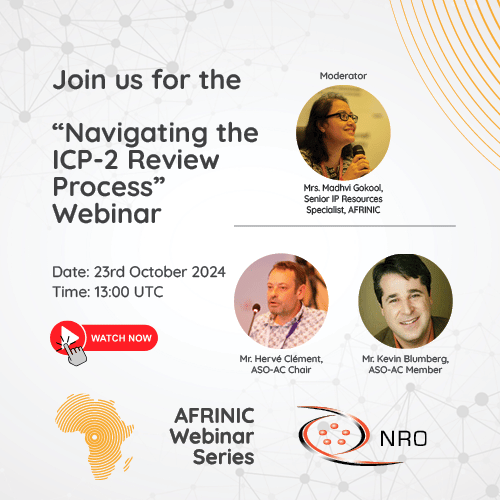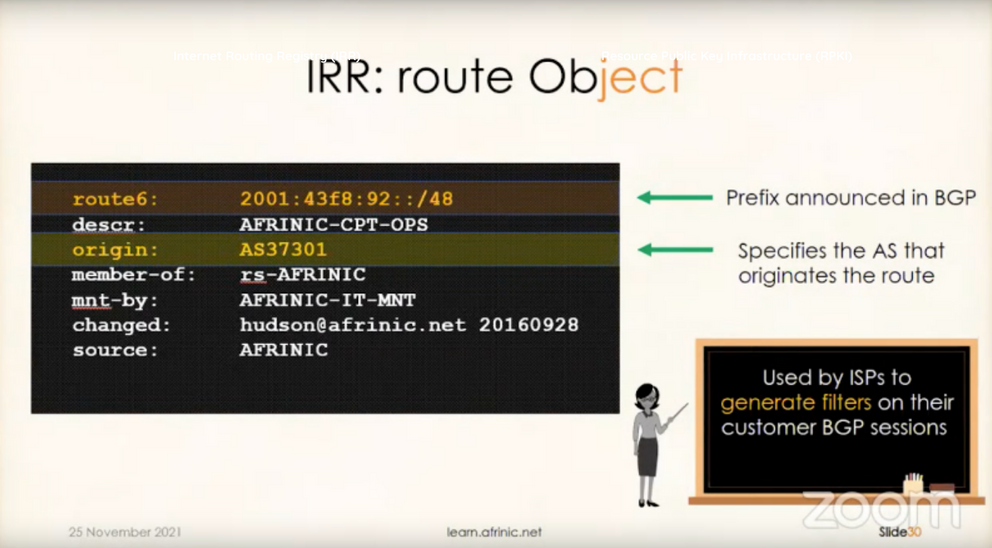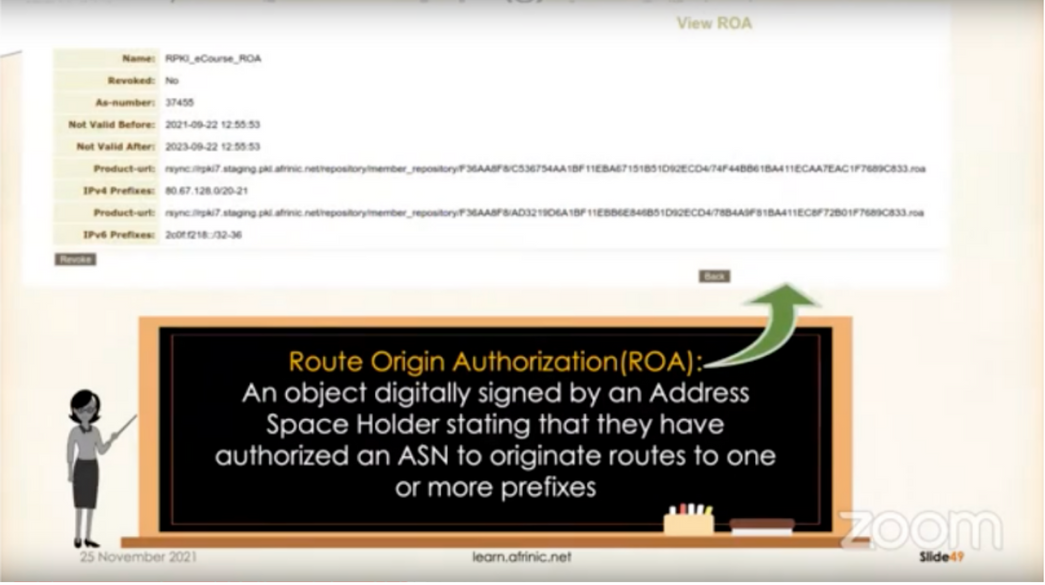
Who is AFRINIC?

Who is Eligible To Get IP Resource From AFRINIC
IP Resource membership is open to any organisation meeting the following:
-
Legally incorporated within, and providing services in the African service region
-
Must be involved in using, or business of providing, open system protocol network services.
-
Able to justify its need for the right to use Internet Number Resources to AFRINIC
The IP addresses delegated by AFRINIC can either be:
- to a Service provider, also referred to as Local Internet Registries (LIR), who will then assign or sub-allocate to their end-user customers or other downstream service providers respectively. This type of IP address delegation is known as “Allocation” and the IP resources issued are referred to as Provider Aggregatable (PA) IP prefixes,
- to End-Site institutions that are not in the business of Internet and Internet based service provision; but require the IP resources to operate their enterprise or campus network with the ability to control their routing policies, this second type of delegation is known as “Assignment” and the IP resources issued are referred to as Provider Independent (PI) IP Prefixes.
Advantages of Having Directly Delegated IP Space from AFRINIC
Having your own dedicated IP address space brings a number of advantages to your network. We highlight below, some of these key advantages:




Additionally; you can easily and quickly increase the number of network devices by provisioning the available IPs from your delegated pool without relying on an upstream provider.
AFRINIC Services
In addition to the benefits we have shared so far, having an IP space assigned or allocated to you by AFRINIC, gives you access to a range of additional AFRINIC’s services at no extra cost. Here are some of the key services from AFRINIC:
Routing Security and Performance
Internet Routing Registry (IRR)
Sample Route Object: A route object tells the world which network (ASN) has the right to originate(use) and IP space.
List of routing registries
Resource Public Key Infrastructure (RPKI)
Reverse DNS (rDNS)
For any IP address blocks that IANA allocates to AFRINIC, they also delegate the corresponding reverse DNS zones within their centrally administered 'in-addr.arpa' and 'ip6.arpa' zones (i.e 196.in-addr.arpa) such that AFRINIC can further delegate to its resources members.
Resource members can request reverse DNS delegation for the IPv4 and IPv6 resources they received from AFRINIC. The domain name requires that a resource member provides hostnames of their authoritative name servers.
This enables AFRINIC to direct DNS queries to the correct authoritative name servers for your reverse domain, where applications can fetch the correct information to map an IP address to a hostname.
The rDNS service is crucial for the proper functioning of your mail server and mail originating applications, as well as spam mitigation.
AFRINIC encourages that resource members must ensure that their name servers are properly configured for these reverse domains and responding authoritatively before requesting delegation from AFRINIC, and this tool https://afrinic.net/whois/lame is helpful to determine if your servers are properly configured.
Capacity Building
In addition to the benefits we have shared so far, having an IP space assigned or allocated to you by AFRINIC, gives you access to a range of additional AFRINIC’s services at no extra cost. Here are some of the key services from AFRINIC:
AFRINIC offers a range of training programmes to help its members build their technical capacity and expertise. These programs cover a variety of topics, including IPv6 deployment, IPv6 routing, Securing your routing with IRR and more.
AFRINIC's Deployathons are hands-on workshops that provide engineers with the skills and knowledge they need to securely deploy IPv6 and other Internet technologies within the guidelines of industry best practices.
Internet Development Programs: Fellowships, Sponsorships, and Grants
Our initiatives include:
Fellowship Program: This program prepares future African Internet leaders by providing opportunities for individuals to participate in AFRINIC events, such as the Africa Internet Summit (AIS) and other conferences. Fellows receive training on various topics related to Internet technology and governance. The program is open to individuals from African countries actively involved in Internet development.
Sponsorships and Grants: AFRINIC provides funding, technical support, and capacity-building opportunities to organizations working on projects aimed at improving Internet access and infrastructure in Africa. We support initiatives such as community networks, Internet exchange points, and capacity-building projects.
Through these initiatives, AFRINIC empowers individuals and organizations to drive meaningful change and innovation in the Internet landscape across the continent. We believe in creating an open, accessible, and secure Internet environment for all Africans.
To learn more about AFRINIC's Internet Development Programmes and the diverse forms these initiatives can take, visit: https://www.afrinic.net/internet-development-programs
Participating in the AFRINIC Community: Voting, Shaping Policies, and Mailing-Lists
In addition to shaping policies, IP Resource members hold the right to participate in the governance of AFRINIC including casting of votes in Board of Directors elections and other relevant resolutions at the Annual General Meetings. By participating in the AFRINIC community, members can help shape the future of the organisation and the Internet in Africa.
To summarise, as an AFRINIC member you can:





Through its various programs, AFRINIC plays a critical role in supporting Internet development in Africa. By offering fellowships, sponsorships, and grants, AFRINIC helps in building capacity and promoting the growth of the Internet ecosystem on the continent. AFRINIC's support to community networks, Internet exchange points, and other initiatives also helps to create a more open, accessible, and secure Internet for all Africans.






